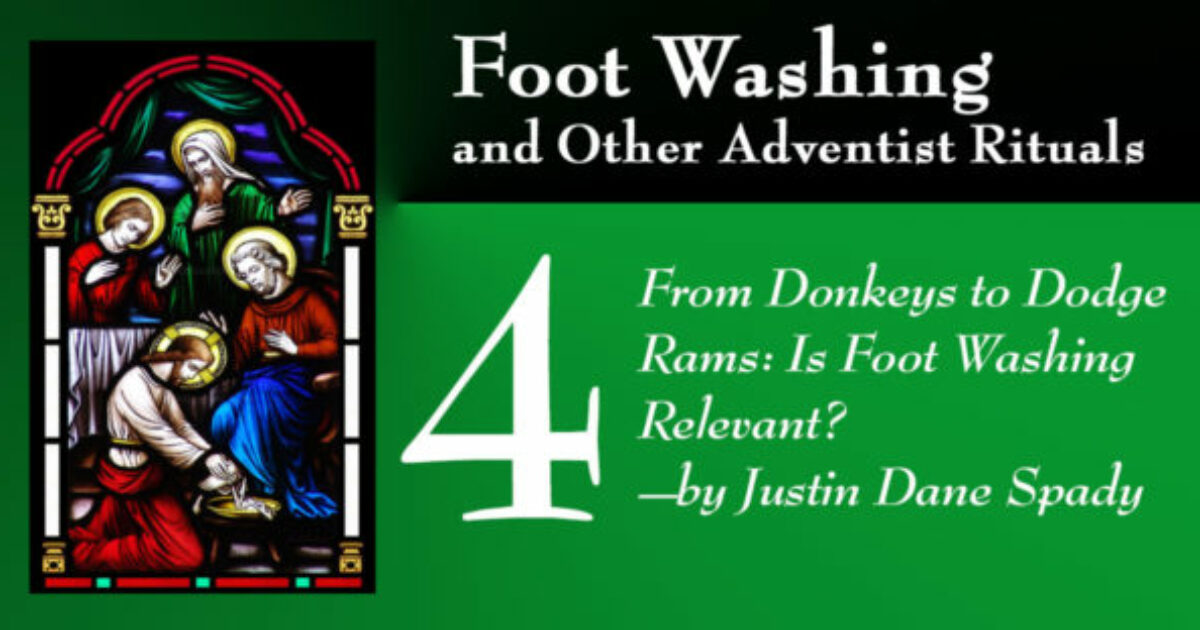From Donkeys to Dodge Rams: Is Foot-washing Relevant?
by Justin Spady | 16 February 2020 |
My mom likes to keep her home as tidy as possible. Growing up, we always took our shoes off when we entered the house. My wife and I still do today. As a pastor, whenever I visit members’ homes I ask if I should take off my shoes because many people wear their shoes indoors.
Wearing your shoes to the dinner table and in your bedroom is a recent development in human history. In Western culture, the transition in the twentieth century from animals to automobiles for transport means we no longer walk in manure on muddy streets. City streets are kept cleaner with indoor plumbing. Close-toed shoes and socks mean our feet never get dirty like those wearing sandals in Jesus’ day.
Changes in technology and culture mean habits and traditions change too. The ancient hospitable practice of having guests’ feet washed before a meal is first recorded in the Bible way back in Genesis 18:4 when Abraham offered it to three strangers (who happened to be God and two angels). The practice is mentioned elsewhere in scripture (Gen. 19:2; 24:32; 43:24; 1 Sam. 25:41; Luke 7:44; John 12:3; 1 Tim. 5:10). Often, hosts had servants wash the guests’ feet because feet were ritually and literally unclean.
However, thousands of years later, the practice has died out. Even in our home in America where we take off our shoes, we do not have a bowl of water at the front door – our feet are already clean. (We also do not have hired or indentured servants, but that is a different matter.)
Yet the practice of foot-washing has not wholly died out, because Jesus in John 13:1-15 washed His disciples’ feet before the Last Supper and told them to do likewise. As Bible-believing Christians, we strive to emulate the life of Jesus. Faithful Adventists have been performing the ritual, often called the Ordinance of Humility, since before the organization of the Seventh-day Adventist church. The practice has not been without controversy, however, and even today I have church members who ask why we still do it.
Those who argue against foot-washing cite a variety of reasons, including its inconvenience when scheduling the worship service and how the act disgusts them. While we may sympathize, inconvenience or the “gross factor” should not keep us from following God’s commands. In all our beliefs, the Adventist church has always started from a point of general understanding of a subject, to a more detailed and comprehensive understanding as we studied the Bible. Consider how the church over time developed its beliefs on the Sabbath or on tithes and offerings.
That said, those in favor of foot-washing can be equally at fault when they use arguments such as “Ellen White did it, so we should do the same” and “I have always been blessed when I participate.” Hearkening to traditions and personal feelings can keep the church from growing in the fullness of Christ. Consider how the church developed its beliefs on the Sabbath, or the Trinity, or vegetarian eating. At one point in her life, Ellen White ate pork and kept Sunday holy; that does not mean we should too. Whether we affirm or change our understanding of foot-washing, it must be done only by a careful and comprehensive survey of scripture.
The Evidence
As I said earlier, foot-washing is mentioned a surprising number of times throughout the Old and New Testament. Far from being an obscure practice from only one culture, it seems to span most of human history and is found throughout the Bible lands. The Bible talks about foot-washing as if it a common practice that everyone understands, not detailing how it is performed. However, none of the times foot-washing is mentioned outside of John 13 are referring to a repeated act of worship. Every reference has to do with everyday hospitality. The one act of worship is Mary’s washing Jesus’ feet with fragrant oil, but we are not reenacting Jesus’ preparation for burial when we wash each other’s feet. Foot-washing is never mentioned in Acts or in Paul’s writings as something the church continued to use in their worship. We base our entire doctrine of the ordinance of humility on one passage, John 13:1-15. Scholars generally agree that the gospel of John was written decades after the other three gospels to fill in missing information. The synoptic gospels—Matthew, Mark, and Luke—which laid the groundwork of the Christian faith do not record the event.
This is in stark contrast to other Christian ordinances. Communion, or eating the unleavened bread and drinking the grape juice, is mentioned in all four gospels (Matthew 26:26-29; Mark 14:22-25; Luke 22:14-23; John 13:18-30). Jesus says He will not again partake of the bread and wine with them until His kingdom is established. Curiously, the story of communion emphasizes the phrase that Jesus “broke the bread.” In Luke 24:13-35, when the resurrected Jesus meets two disciples on the road to Emmaus, the author repeats twice that the two do not recognize who Jesus is until He blessed and “broke the bread.” Immediately after Jesus broke the bread, He disappeared, having not eaten it. In the Acts of the Apostles, the early church in Jerusalem is described as “breaking bread” together regularly as part of what defined them as the Body of Christ (Acts 2:42,46). Jesus uses eating bread as a powerful symbol of accepting His words (John 6:22-71). Finally, Paul talks about the communion service in 1 Corinthians 11:17-34 as a well-established ordinance in the Christian worship service and separate from a regular meal. Baptism too is well-established multiple times in the Gospels as something Jesus exemplified for us; Paul in Romans 6:1-11 defines the significance of the ritual; and there are numerous examples throughout the New Testament of the early church continuing the practice of baptism.
Considering then that, unlike communion and baptism, foot-washing in the worship service is based solely on one passage, then John 13 must be very clear that repeating the ritual is of vital importance to our salvation, yes? But it is not so clear. In John 13:12-15, Jesus instructs His disciples to humbly serve one another, but there is no specific command that it needs to be done in conjunction with a worship service or with communion. We have historically assumed it does, but based on the previous evidence, Jesus’ words could be interpreted differently. It is a legitimate, and more evidence-based, interpretation that Jesus was simply saying they should be willing to serve one another in lowly everyday tasks including, but not limited to, foot-washing.
The principle of humility is important. Pride was the disciples’ most common sin, but not once is foot-washing referenced outside of John 13 as a way for them to remember to be humble. There were conflicts in the church between Jews and Gentiles, but not once do the apostles say the Jews should wash the Gentiles’ feet, and vice versa. In fact, the whole point of 1 Corinthians 11:17-34 is humility in the communion service. If the purpose of foot-washing is remembering to be humble before the communion service, then Paul missed an ideal opportunity to reference it.
As the final nail in the coffin, we should consider Jesus’ intent. From His parables drawing from real-life events and common legends, to His applying physical healing to spiritual lessons, to using bathing and eating as ways to symbolize our need for Him, Jesus was always about using practical illustrations that people readily understood. Eating and drinking are universal necessities that will continue into eternity. Foot-washing is an archaic practice with no application to our daily reality.
A Fundamental Ordinance?
I personally find foot-washing meaningful. I am not arguing that we must do away with the practice as a global church. The point is simply that when we weigh the totality of the evidence in scripture, the ritual of foot-washing is not a fundamental ordinance like communion or baptism. If someone were to choose not to participate, in the grand scheme of things is it worthy of us crucifying them? If a local church were to choose to stop doing it, in the grand scheme of things are they really missing out on the full grace of God?
Part of the problem is that some converts to Adventism bring with them an incorrect belief of sacramental power in rituals. The early Christian church did not view ordinances that way. In Acts 15, the early church struggled with what outward actions were necessary for all converts. They decided that actions such as circumcision and feast days, while filled with profound meaning, were ultimately unnecessary for salvation. Our salvation is not from outward rituals, but from “grace, through faith…not of works, lest anyone should boast” (Ephesians 2:8,9). If we are to insist that certain symbols such as baptism and communion, while not magically sacramental in themselves, are still vitally important for the Christian to perform today, then like the church in Acts 15 we need (and do have) a mountain of Biblical evidence to back up the claim.
The principle of humility is of utmost importance, and we can glean some truths about humility from foot-washing; but if we raise the ritual to a level of importance greater than it is (like judging someone who does not participate while we as a church argue whether men are greater than women in the kingdom of God), then perhaps Jesus would caution us as He did the Pharisees of old that “you pay tithe of mint and anise and cumin,” and wash each other’s feet, “and have neglected the weightier matters of the law: justice and mercy and faith. These you ought to have done, without leaving the others undone” (Matthew 23:23).
 Justin Spady is a district pastor in Wausau, Wisconsin, where he lives with his wife and daughter. He enjoys reading, painting, and staying physically active. His passion is sharing the everlasting good news of Jesus, and he loves his professional calling as an encourager and equipper of the Body of Christ.
Justin Spady is a district pastor in Wausau, Wisconsin, where he lives with his wife and daughter. He enjoys reading, painting, and staying physically active. His passion is sharing the everlasting good news of Jesus, and he loves his professional calling as an encourager and equipper of the Body of Christ.




